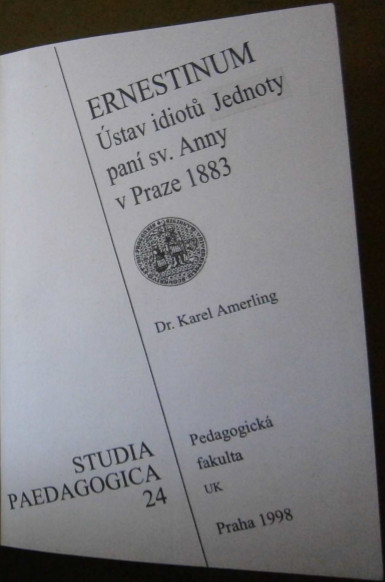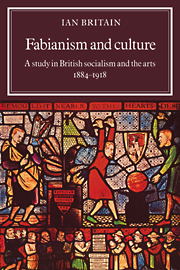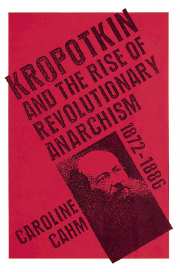Karl Amerling: Die Idiotenanstalt des Sct. Anna-Frauen-Vereins in Prag vom Jahre 1871-1883 (1883/1998) [German/Czech]
Filed under book | Tags: · 1870s, 1880s, biology, pedagogy, psychiatry

“Ernestinum, jinak Ústav idiotů Jednoty paní sv. Anny v Praze, byl ústav pro choromyslné, který založil Karel Slavoj Amerling 17. června 1871 v Praze. Sídlil nejprve v Kateřinské ulici na Novém Městě Pražském, už 1. listopadu téhož roku se ale přestěhoval do svého nového útočiště, Šternberského paláce na pražských Hradčanech (dnes jedna z poboček Národní galerie).
Amerling o chodu ústavu napsal (německy, protože nevěřil v odpovídající ohlas v češtině) práci Die Idiotenanstalt des Sct. Anna-Frauen-Vereines in Prag nach ihrem zwölfjährigen Bestande vom J. 1871-1883, do češtiny byla přeložena až roku 1997 Janou Kepartovou. Jde o neobyčejně náročný text, neboť Amerling používá mnoho vlastních neologismů, do nichž promítá své rozsáhlé vzdělání – např. jeho vlastní metody diasofie (průvěda, něm. Orientierungslehre) a mathese; dále pojmy jako dioikete, edentát, archonom, exilast, chrémat (výrobní pud), makropelmus (jedinec s nezvykle širokýma nohama a podobnýma rukama), psychozot, proterot (‘upovídaný, zbrklý blázen’), hyperkinet (‘němý, neklidný běžec’) aj.
Podle Amerlinga se lidský život dělí do dvanácti fází po sedmi letech, přičemž ‘všechny roky po ukončení 84. roku života jsou mimořádné a taktéž všechny roky před 84. rokem života, neboť životní řád obnáší přesně dvanáctkrát sedm let.’
Během existence ústavu se v něm vystřídalo asi 166 chovanců (mužů i žen), ročně od šesti (v Kateřinské ulici) do šedesáti roku 1883.” (from Wikipedia)
German edition
Self-published, Prague, 1883
152 pages
via Eťa Kazmuková
Czech edition: Ernestinum: Ústav idiotů Jednoty paní sv. Anny v Praze: stav po 12 letech trvání (1871–1883)
Translated by Jana Kepartová
Publisher Pedagogická fakulta Univerzity Karlovy, Praha, 1998
Studia Paedagogica 24
ISBN 8086039447
132 pages
wikipedia (CZ)
PDF (German, no OCR)
PDF (Czech, no OCR)
Ian Britain: Fabianism and Culture. A Study in British Socialism and the Arts, c. 1884–1918 (2005)
Filed under book | Tags: · 1880s, 1890s, 1900s, 1910s, art, political theory, socialism, united kingdom

“This book is an attempt to remedy the neglect of the cultural and aesthetic aspects of English socialism in the late nineteenth and twentieth centuries. An outstanding symptom of this neglect is the way in which the Fabian Society, and its two leading lights, Sidney and Beatrice Webb, have usually been depicted as completely indifferent to art and to the artistic ramifications of socialism. Most commentators have painted Fabian socialism as a narrowly utilitarian programme of social and administrative reform, preoccupied with the mechanisms of politics and largely obvious of wider, more ‘human’ issues. One of the basic aims of the book is to question this bleakly philistine image, by showing the basis of the Fabians’ beliefs in romancism as well as utilitarianism.”
Publisher Cambridge University Press, 2005
ISBN 0521021294, 9780521021296
360 pages
PDF (updated on 2016-9-8)
Comment (0)Caroline Cahm: Kropotkin. And the Rise of Revolutionary Anarchism, 1872-1886 (2002)
Filed under book | Tags: · 1870s, 1880s, anarchism, communism, politics, revolution, socialism

This major study of Peter Kropotkin sets him firmly in the context of the development of the European anarchist movement as the man who became, after Bakunin’s death, their chief exponent of anarchist ideas. It traces the origins and development of his ideas and revolutionary practice from 1872 to 1886, and assesses the subsequent influence of his life and work upon European radical and socialist movements. Dr Cahm analyses Kropotkin’s role in the transformation of Bakunin’s anti-authoritarian socialism, and shows how two principal types of revolutionary action emerge from anarchist efforts to develop clear alternatives to the parliamentary strategies of social democrats; one based on the activity of individuals and small groups, the other related to large-scale collective action.
Publisher Cambridge University Press, 2002
ISBN 0521891574, 9780521891578
388 pages

